Dire predictions about foreign intervention leading to “World War III” aren’t merely the most predictable and laziest form of anti-interventionist “logic,” argues Jamie Kirchick. They’re also an insidious echo of Soviet propaganda, routinely deployed to undercut the West’s defense of democracy and important international norms. This piece originally appeared in the Washington Post.
Days before the 2016 presidential election, candidate Donald Trump warned: “You’re going to end up in World War III over Syria if we listen to Hillary Clinton.”
Good thing President Trump ignored him.
Dire predictions about foreign intervention leading to “World War III” aren’t merely the most predictable and laziest form of anti-interventionist “logic.” They’re also an insidious echo of Soviet propaganda, routinely deployed to undercut the West’s defense of democracy and important international norms. If Trump had listened to his former self, he’d have abdicated an opportunity to enforce the global prohibition against use of chemical weapons.
On the campaign trail, Trump said Clinton’s suggestion of establishing a no-fly zone to protect civilians would risk confrontation with nuclear-armed Russia, which had sent men and materiel to abet Bashar al-Assad’s murderous regime. “You’re not fighting Syria anymore, you’re fighting Syria, Russia and Iran, all right?” Trump explained. “Russia is a nuclear country, but a country where the nukes work as opposed to other countries that talk.”
But after a recent chemical weapons attack against civilians reportedly perpetrated by the Assad regime, Trump ordered airstrikes against three Syrian government targets in concert with allies Britain and France and, noticeably, a world war didn’t start.
Before missiles were launched, the Pentagon warned Moscow through already established “deconfliction” channels that strikes were imminent, and subsequently, no Russian assets were hit. Russia vigorously protested the action against its client state—one in which it has an air and a naval base—but retaliation was entirely verbal, consisting of the usual diplomatic double talk at the United Nations, after this initial statement by Russia’s ambassador to the United States:
Statement by the Ambassador Antonov on the strikes on #Syria:
A pre-designed scenario is being implemented. Again, we are being threatened. We warned that such actions will not be left without consequences.
All responsibility for them rests with Washington, London and Paris. pic.twitter.com/QEmWEffUzx— Russian Embassy in USA 🇷🇺 (@RusEmbUSA) April 14, 2018
This was unsurprising, and transparent, as Russia—which plays a non-trivial role in perpetuating the Syria conflict—has little desire to pick an actual fight with the world’s most powerful military over a limited airstrike meant to punish specific war crimes, not overthrow the Assad regime. Nonetheless, in the days leading up to the strike, critics resorted to an apocalyptic framing of the conflict. Russian state television encouraged citizens to stock up on water and emergency supplies. In the United Kingdom, the Telegraph ran a headline asking, “could Britain be drawn into World War Three?” and the Daily Express ran one declaring “World War 3 ALERT: The ‘REAL reasons’ Trump is going to war in Syria.” Germany’s widely read Der Spiegel blared (in a headline since changed), “‘Get Ready Russia’: Donald Trump Risks a World War in Syria.” In the United States, Salon ran with the headline, “Trump and allies approach World War III in Syria, on literally no evidence.”
The claim that increased American military activity in Syria—whether in the form of a no-fly zone to protect civilians or the sort of precision airstrike carried out last week—would precipitate world war is one made by noninterventionists across the political spectrum. But as Washington Post columnist Anne Applebaum explained back in 2016, when Trump initially used this line of attack against Clinton, the threat of World War III erupting over Syria could be sourced back to Russian propaganda, which painted the former secretary of state as a deranged “warmonger.” The specter of Western democracies plunging humanity into world war, though, claims a pedigree much older than the most recent American presidential election. Or the present-day U.S.-Russia dynamic. From the onset of the Cold War, it was a staple of Soviet propaganda meant to cast the United States as the aggressor and the Soviet Union as the bulwark of global “peace.”
As the Soviet Union lowered its Iron Curtain across Central and Eastern Europe in the ashes of World War II, Moscow castigated opposition to its moves as risking World War III. Instrumental in this effort was perversion of the word “peace.” To win over potential allies in the West, Soviet leader Joseph Stalin orchestrated the creation of communist front groups and conferences with anodyne names like the “World Peace Council” and the “World Congress of Partisans for Peace.” The real purpose of this campaign wasn’t the promotion of “peace,” however, but Soviet foreign policy; the cynical implication being that anyone remotely skeptical of an organization or conclave with “peace” in its name was obviously in favor of war. George Orwell satirized this abuse of language in his masterpiece, “1984,” imagining a fictional superstate with the slogan: “WAR IS PEACE FREEDOM IS SLAVERY IGNORANCE IS STRENGTH.”
Across the globe, Moscow-backed peace outfits decried opposition to Soviet prerogatives as fascist agitation that would bring about another world war. At the 1949 National Labor Conference for Peace in Chicago, the Communist Party USA newspaper, the Daily Worker, reported “new opportunities for massing the strength of labor against the fomenters of the Cold War and the preparations for World War III.” The following year, after the United States joined a United Nations-led mission to resist the Soviet Union and China-backed invasion of South Korea by North Korea, the American Communist Party announced, “American imperialism has now entered the open military phase of its preparations to unleash World War III, threatening to embroil the whole world in a new world holocaust.”
Talk of World War III mostly abated throughout the years of detente but returned with a vengeance after the election of President Ronald Reagan and the subsequent “Euromissile” debate, one of the last great strategic confrontations of the Cold War. In the late 1970s, the Soviet Union began deploying intermediate-range nuclear warheads in Eastern Europe. As NATO debated whether to match this provocation by stationing similar weapons on its own territory, the Soviets launched a propaganda onslaught, echoed by Western sympathizers, insisting that any attempt to deter its nuclear blackmail would result in nuclear Armageddon.
“Stopping World War III” was the blunt title of a 1981 book published by the U.S. Peace Council, the American chapter of the Soviet-backed World Peace Council. “We fought World War I in Europe; we fought World War II in Europe and, if you dummies will let us, we will fight World War III in Europe,” declared Gene La Rocque, a retired U.S. Navy admiral who went on to become a fierce critic of American foreign policy and advocate for the dissolution of NATO. La Rocque’s Center for Defense Information, a think tank devoted to criticizing U.S. military spending, produced a 1983 documentary about nuclear weapons, “War without Winners.” Narrated by Paul Newman, it invited viewers to “contribute to preventing World War III.” Writing in the Guardian that same year, British Marxist historian E.P. Thompson, a founding member of European Nuclear Disarmament, claimed NATO was a “war movement” instigating “the preliminaries of World War III.”
Following the collapse of Soviet communism, and as Putinist Russia began to attract sympathizers on the political right, the rhetoric of “World War III” expanded beyond traditional leftist redoubts. “Are we far from World War III?” former Texas Republican congressman, GOP presidential candidate and 1988 Libertarian Party presidential nominee Ron Paul asked last April, when Trump first struck Syria after its use of banned chemical weapons. “If you’re in favor of World War III, you have your candidate,” his son, Sen. Rand Paul (R-Ky.), declared during a 2015 Republican presidential debate after then-Gov. Chris Christie (R-N.J.) called for a no-fly zone over parts of Syria. “We can’t risk World War III,” alt-right leader Richard Spencer tweeted at the time, imploring his followers to attend a protest against the strikes. A search for “World War III” on the paleoconservative clearinghouse Antiwar.com yields hundreds of results; the same for Ron Paul’s Institute for Peace and Prosperity.
Ideology aside, and intended or not, invocations of “World War III” have the same net effect: to obfuscate the belligerence of authoritarians and discourage deterrence by democracies. During the Cold War, it was never NATO—a consensual and defensive alliance of democratic nations—which threatened world peace but rather the Soviet-dominated Warsaw Pact, which invaded Hungary in 1956, Czechoslovakia in 1968, and held Central and Eastern Europe in its grip until dissolving in 1991. Today, aided by guileless Westerners, the Russians insist that letting them get away with invading sovereign countries and suborning mass murder in Syria is predicate to preventing world war. A variant of “warmonger”—an epithet which roughly translates, in this context, into “critic of Russian foreign policy”—conjurings of “World War III” are a rhetorical means by which Russia psychologically projects its own bellicosity and lawlessness onto the West.
The purpose of invoking “World War III” isn’t to sound genuine alarm. It is to foster a culture of war-weary appeasement within one’s adversaries.
Of course, Moscow is capable of “turning the United States into radioactive ash,” as one of the Kremlin’s propagandists declared shortly after the Russian annexation of Crimea in 2014. But knowing the United States has the same nuclear capability has reliably prevented it from ever acting upon such a threat, and Russia certainly won’t risk doing so over a few dozen Tomahawk missiles fired at its troublesome puppet, Assad.
The purpose of invoking “World War III” isn’t to sound genuine alarm. It is to foster a culture of war-weary appeasement within one’s adversaries. That so many in the West have adopted this overwrought characterization indicates the triviality of much of our foreign policy debate.
Ponder a world where America and its allies backed down from their commitments and principles at every Russian cry of imminent world war. We would have surrendered West Berlin to Soviet blackmail, abandoned South Korea to the totalitarian North and permitted the placement of nuclear missiles 90 miles off the Florida coast. Thankfully, we never took empty World War III threats seriously. We shouldn’t do so today.
The Brookings Institution is committed to quality, independence, and impact.
We are supported by a diverse array of funders. In line with our values and policies, each Brookings publication represents the sole views of its author(s).

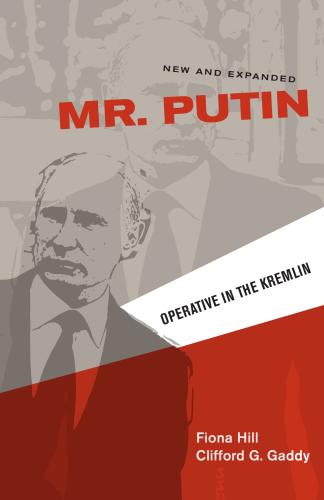
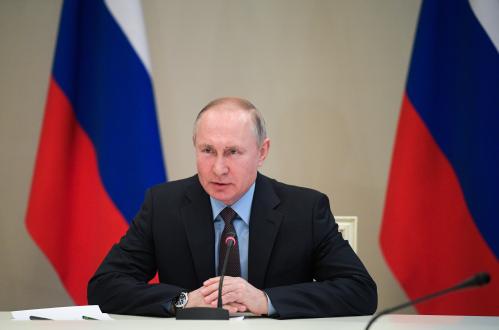
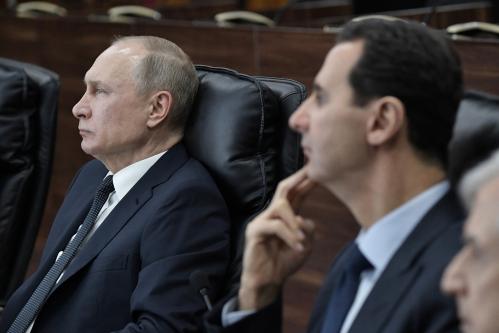



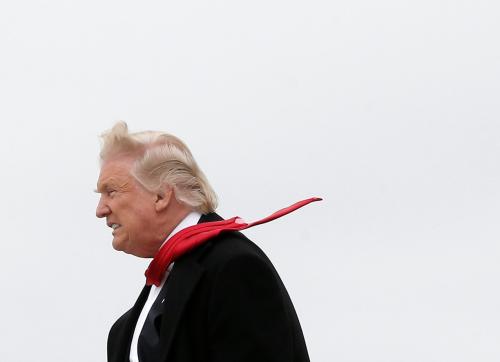
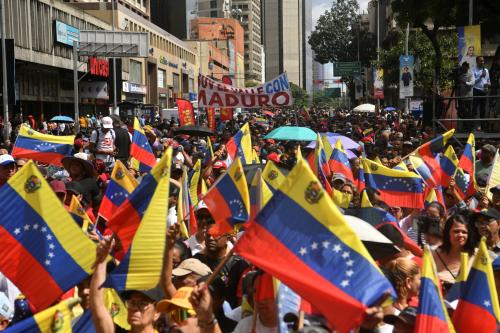
Commentary
The Soviet roots of invoking fears about World War III
April 24, 2018